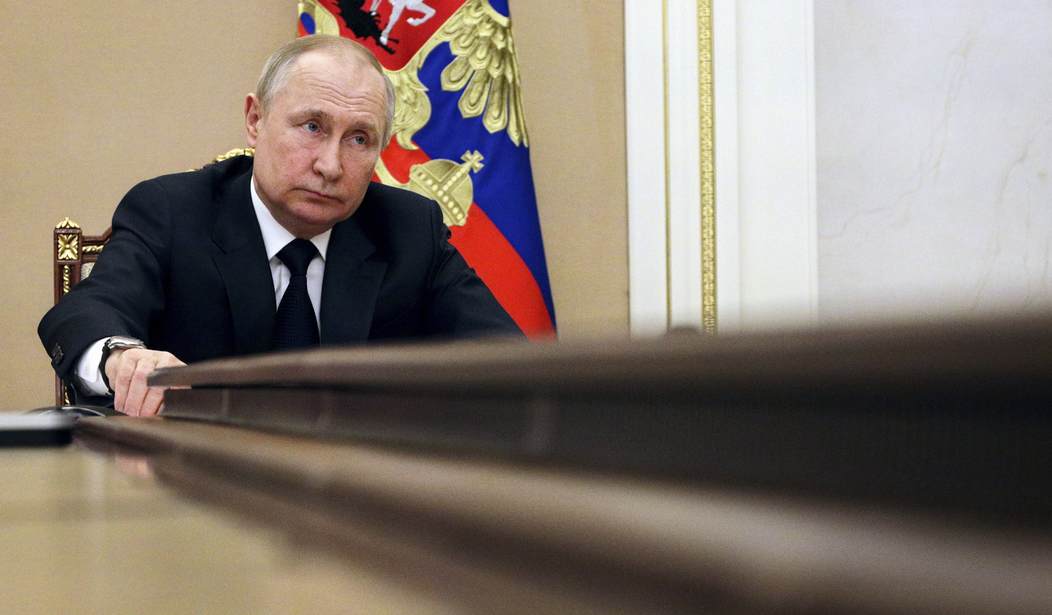Did Vladimir Putin really order a hit on pipelines for his own gas exports just to score some points on the EU? Leaders in Europe and in NATO suspect that Russia conducted sabotage against the Nord Stream pipelines in the Baltic Sea, and they’re barely veiling the accusation. They warned of a “strong response” to any attacks on energy infrastructure after determining that the “leaks” were clearly intentional attacks:
Danish and Swedish authorities detected underwater explosions Monday and reported three breaches on the Nord Stream 1 and 2 gas pipelines, pouring tons of methane into the Baltic Sea.
Seismologists in Denmark and Sweden said the two blasts they detected did not appear to be earthquakes, landslides or other natural activity.
“These incidents are not a coincidence and affect us all,” E.U. foreign policy chief Josep Borrell said. “All available information indicates those leaks are the result of a deliberate act.”
Borrell called the disruption “utterly unacceptable.” He also mirrored earlier comments from European Commission President Ursula von der Leyen, who said on Twitter on Tuesday: “Any deliberate disruption of active European energy infrastructure is unacceptable and will lead to the strongest possible response.”
Two German lawmakers went on the record to accuse Russia, claiming that their intent was to rattle their energy markets and destabilize prices. One noted that this kind of attack fits directly into Putin’s modus operandi:
Roderich Kiesewetter, a government spokesman for crisis prevention, said in a tweet late Tuesday that the attack was an act of sabotage by Russia to deter and threaten Europe.
Marie-Agnes Strack-Zimmermann, chairwoman of the Bundestag’s defense committee, also named Russia in comments on the suspected attacks to the Redaktionsnetzwerk Deutschland (RND) news network.
“The longer and more brutal the Russian attack on Ukraine lasts, the greater the risk of such unrestrained attacks,” Strack-Zimmermann told RND of the Nord Stream incident, adding: “It cannot be ruled out that they will be directed by Russia in order to shake our markets.”
In separate comments to RND, Kiesewetter said: “It is likely that Russia is trying in this way, on the one hand, to stir up uncertainty among the European population and, on the other hand, to once again point out at the state level the possibility of an attack on critical infrastructure.”
He added: “Such an act of sabotage would also fit with Russia’s state-terrorism and hybrid approach.”
Does this make sense, though? Russia had already cut off gas supplies in Nord Stream 1, in large part because Germany had stopped the certification process of Nord Stream 2 as part of the sanctions following Russia’s invasion of Ukraine. Yesterday, I had gamed out the cui bono question for Russia and wondered what they would gain with such a short-term stunt. They could simply disconnect the pipelines at their source rather than sabotage them, although the latter leaves the false-flag option open. At some point, in the longer term, Russia will need those exports to generate hard currency income … assuming they can ever convince European nations to buy their output again.
On the other hand, Putin has proven conclusively in his Ukraine debacle that he’s utterly incompetent at long-term thinking. It’s not even clear that he cares any longer about Russian exports to Europe in the future. Coincidentally — or not — Gazprom picked this moment in time to warn that it will cut off its land-based pipeline, which did send prices shooting upward:
Russia’s state-run energy giant Gazprom has warned it could cut flows of natural gas to Europe via Ukraine, its last link still delivering to buyers in western Europe. …
Gazprom and Ukrainian company Naftogaz are facing off in a legal dispute over pipeline gas deliveries, which is prompting worries about further cuts to gas flows to Europe.
Naftogaz, which organizes the movement of Russian gas to Europe via pipeline, has accused Gazprom of failing to pay transit fees, but the Russian company says it won’t pay for services that haven’t been provided.
Naftogaz wants the dispute to be settled in Switzerland — which Gazprom said is “unfriendly” to Russia, given it backs western sanctions over the Ukraine war. It said Moscow could sanction the Ukrainian company if it pursues the case.
“In practice, this will mean a ban on Gazprom from fulfilling obligations to sanctioned persons under completed transactions, including financial transactions,” it said in a statement via Telegram on Tuesday.
Let’s add something else to the cui bono discussion for Russia. The point of alleged Russian sabotage could be to make support for Ukraine politically impossible due to the economic damage Russia can do by striking Europe’s energy infrastructure — even its dormant components. As Business Insider notes, the attacks did send nat-gas prices soaring again, which will inevitably put pressure on European politicians to figure out ways to alleviate those impacts. That will lead to a lot of anger and hostility from European voters and consumers, at least until alternate sources of energy can be developed.
In the longer term, that will undercut Russia’s access to EU energy markets. It will incentivize self-sufficiency rather than reliance on Moscow’s tyrants for stable energy, and the up-front investments will be considered part of a war effort. By the time Russia gets around to normalizing relationships, their nat-gas markets will have largely evaporated in Europe.
However, Putin isn’t concerned about the long term at the moment. He needs the EU to stop supporting Ukraine with heavy arms so that he can figure a way out of the box canyon into which Putin has ordered the Russian army right now.
From Putin’s perspective, this isn’t cutting off his nose to spite his face. It’s chewing off his foot to escape from a trap in the woods. And in that sense, Russia is clearly the prime suspect for the Nord Stream attacks.








Join the conversation as a VIP Member